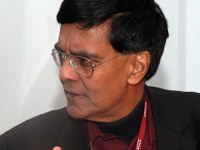 Munsasinghe (TWAS Fellow 1994), an internationally renowned climate change expert and chairperson of the Munasinghe Institute for Development in Colombia, Sri Lanka, makes his remarks in an interview published in the current edition of the TWAS Newsletter.
Munsasinghe (TWAS Fellow 1994), an internationally renowned climate change expert and chairperson of the Munasinghe Institute for Development in Colombia, Sri Lanka, makes his remarks in an interview published in the current edition of the TWAS Newsletter.
"Studies show that poor countries will need USD200 billion a year over the next 10 to 20 years to address the climate change challenge," says Munasinghe.
Yet, at the UN Climate Change Conference held in Copenhagen last December, "rich countries pledged USD30 billion over the next 2 to 3 years, and agreed to provide USD100 billion a year from 2020 onwards."
Munasinghe was not only critical of the financial commitments made in Copenhagen. He also voiced disappointment at the accord that was put together during the final hours of the conference by the United States, China, India, Brazil and South Africa. The two-page document, he notes, contains "no framework for action, no timelines or benchmarks for measuring progress and, most importantly, no legally binding commitments requiring countries to act for fear of international sanctions or penalties. It's all based on goodwill, voluntarism and self-policing."
Despite these concerns, Munasinghe remains optimistic that progress can be made in curbing greenhouse gas emissions and mitigating the impacts of climate change.
He maintains, however, the success of our efforts will depend on several factors. First, "the scientific community must work much harder to provide country-specific information about the potential impacts of climate change." That's because what really counts for people - and, as a result, public officials - is the impact that climate change has at the local and national levels. Second, he says, "scientific studies must focus less on mitigation and more on issues related to vulnerability, resilience and adaptation." That's because "climate change impacts will undoubtedly take place, regardless of what is done going forward." These impacts, moreover, will likely affect the world's poorest and most vulnerable people.
The key, Munasinghe observes, "is to develop science-based strategies that integrate adaptation and mitigation efforts within an overall strategy for sustainable development." This is especially true for developing countries.
"We need to take significant steps in the near future," he advises, "that not only help make poor communities' climate-change-resistant,' but that also offer a blueprint for solving existing problems such as poverty, malnutrition, sickness and resource scarcity."
Download the entire interview below.

